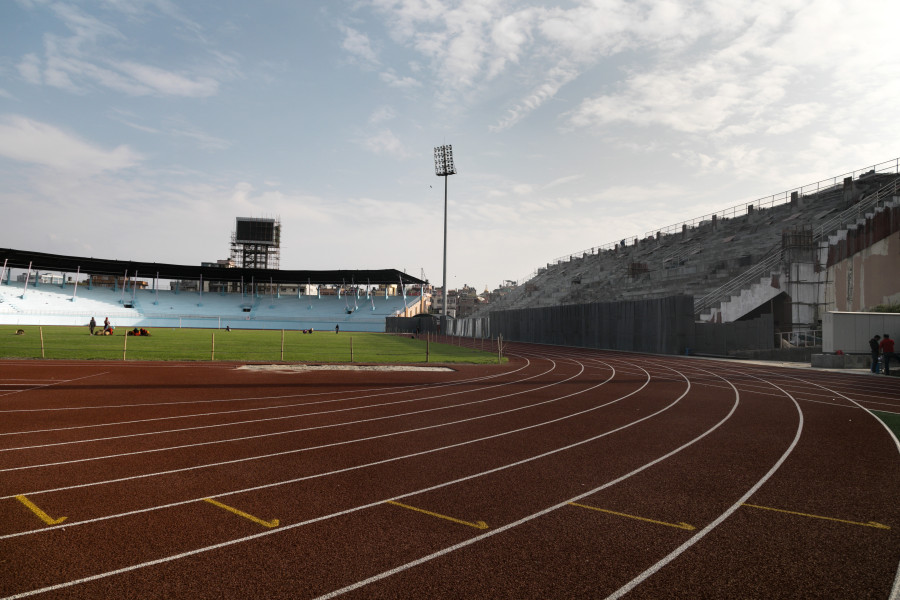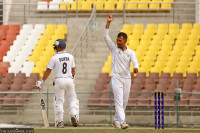Sports
The South Asian Games are a month away but Dashrath Stadium still needs work
Although a new track has been laid and the grounds are being readied, audience seating, changing rooms and a roof for the VIP parapet have yet to be completed.
Sailendra Adhikari
With just a month to go for the 13th edition of the South Asian Games, officials and workers at the Dashrath Stadium, one of the major venues of the games, are racing against time to get the stadium ready for the games. The Games have already been postponed once, from March to December, due to Nepal’s inability to get its facilities ready in time, but if all goes well, the Games will be held simultaneously in Kathmandu and Pokhara from December 1-10.
Dashrath Stadium, Kathmandu’s only large sporting venue, has been consistently under repair ever since it was damaged in the 2015 earthquakes. A new track has been laid and the grounds readied, but the stadium still needs to undergo major refurbishing. Entire sections of the audience seating parapet have yet to be painted over and new seats installed. The roof over the VIP parapet has also yet to be installed.
Given the tight schedule, the National Sports Council has decided not to build a cement roof and install fabric over the VIP parapet instead.
The Council had earlier said that the fabric would arrive by early October from China, but it has yet to make an appearance. Arun Upadhyay, a chief engineer at the Council, however, said the roof work would be completed on time.
“The fibre materials will arrive within two weeks,” said Upadhyay. “Fitting will take another three-four days and everything will be completed on time.”
Besides the opening and closing ceremony, Dashrath Stadium will be hosting the men’s football and the athletics events while the stadium’s covered hall will host the basketball and volleyball games. The Pokhara Stadium will host women's football and cricket, archery, badminton, weightlifting, paragliding, and beach volleyball.
According to Upadhyay, all works pertaining to the Dashrath Stadium and Pokhara Stadium will be completed in time for the Games.
“All materials required for the Pokhara Stadium have already arrived. We only have to put them where they need to be,” he said. “Dashrath Stadium in Kathmandu will also be readied on time.”
Despite Upadhyay’s assurances, doubts remain, given the current state of the stadium where construction material is everywhere and workers are scrambling to meet deadlines.
Much more construction is taking place inside the stadium, where the changing rooms for the athletes are not ready yet. Neither are the referee room, doping centre, medical centre and match conference room.
According to Rabindra Joshi, treasurer of the All Nepal Football Association, renovation of the existing changing rooms has been completed and two more changing rooms will be readied within two weeks. A large hall will play host to the referee room, doping centre, medical centre and conference room—all of which will be housed in partitions.
“The partition works will require just 15 days. We will get it done after Tihar,” said Joshi.
Dasharath Stadium, however, has a new track and digital scoreboard. The old track and an analogue scoreboard were installed in 1999 under Chinese assistance for the eighth South Asian Games. The stadium’s floodlights have also been renovated and a new digital sound system is ready to be installed once the roofing works are complete, said officials.
The pitch at the Dashrath Stadium is also nearing completion. Former FIFA referee and All Nepal Football Association ground supervisor Dilip Rajak, who has been assigned to prepare the grounds, said that the pitch will be ready in three weeks' time.
"A few portions of the pitch require levelling and new grass but it is almost ready,” said Rajak.
Rajak, however, took issue with the time allotted to him to upgrade the grounds.
“Two months to ready the grounds where no games have been played for four years is inadequate. It took us nearly a month just to cut the grass,” said Rajak. “The grounds would have been in much better condition if they had given us at least four months to prepare.”
But Dashrath Stadium is not the only venue that is hurrying to meet deadlines as the event approaches. Another venue in Satdobato, which will host events such as swimming, shooting, karate and boxing, also has unfinished work, especially regarding the heated swimming pool. The National Sports Council is preparing a heated swimming pool for the first time in the country’s sporting history, as the Games are being held in the winter.
Workers are putting in tiles for the pool and also working on the roof. But the heating system has yet to be installed.
“We will install the heating system soon and all other works in the swimming pool will be completed by the end of this month,” said Durga Dulal, chief of the sports council’s publicity branch.
According to the council, all other works are nearing completion, including arranging proper accommodation for foreign athletes and officials.
“We have yet to receive the total number of athletes and officials from the participating nations. We have already booked the hotels and will accordingly arrange accommodation once we get the list by the end of this month,” said Ramesh Silwal, member secretary of the council.
Despite the delays in getting the facilities ready in time for the Games, Silwal was positive about the country’s ability to host an international event of this scale.
“When we received the torch after the completion of the 12th South Asian Games in India, we said we would hold the sporting event on time, but unfortunately it was postponed. We can't blame anyone else in that regard,” said Silwal. “But this time around, everything will be completed on time and the event will go smoothly.”




 22.93°C Kathmandu
22.93°C Kathmandu















